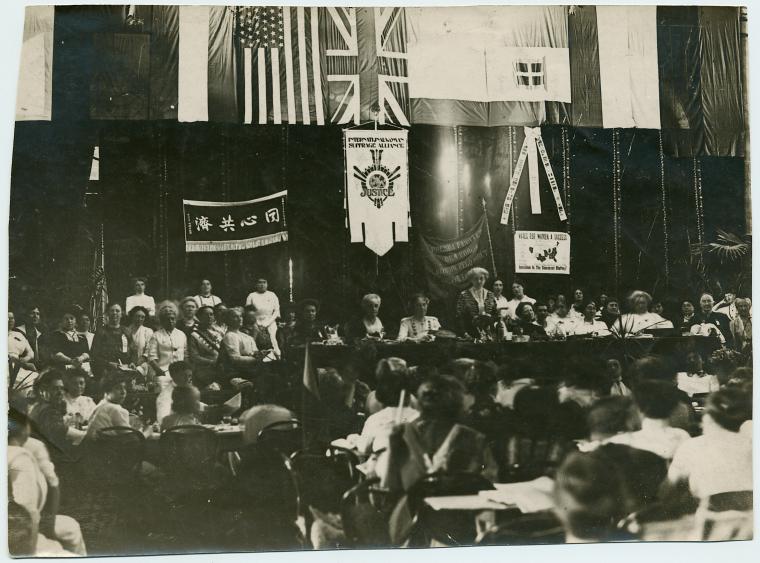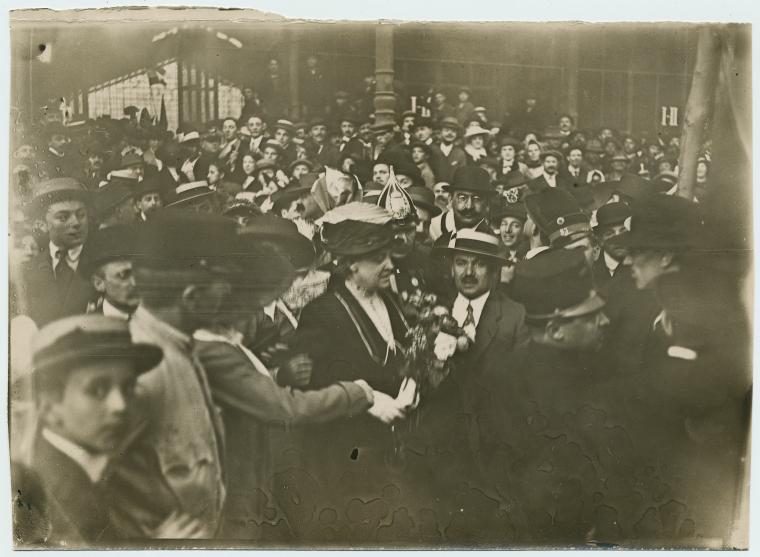Women's History Month
A Vote of One’s Own: The International Woman Suffrage Alliance and Rosika Schwimmer
With the centennial of women’s suffrage just around the corner, it's important to begin highlighting the many women that were involved both nationally and internationally in this movement.
Let's begin with Rosika Schwimmer, who was engaged in many different and intersecting movements. Born in Budapest in 1877 to an upper-middle-class family, Schwimmer would become a major player on the global stage. The Rosika Schwimmer papers, which constitute the bulk of the library's Schwimmer-Lloyd Collection, extensively document her professional life and personal interests, and are a treasure trove of information regarding the activities of prominent colleagues in the pacifist, suffragist, feminist, and world government movements. One such esteemed contemporary was Carrie Chapman Catt, whom Schwimmer met in Berlin in 1904, at an international meeting of women activists.
Two years earlier, Catt led the first International Woman Suffrage Alliance conference in Washington D.C. It produced a Declaration of Principles, which asserted:
“That the ballot is the only legal and permanent means of defending the rights to the 'life, liberty and the pursuit of happiness' pronounced inalienable by the American Declaration of Independence, and accepted by all civilized nations. In any representative form of government, therefore, women should be vested with all political rights and privileges of electors.”
An offshoot of the International Council of Women, this younger organization sought to include and embolden what the International Council of Women would not; active promotion of women’s suffrage. Members of the conference would decide to set up a permanent organization in Berlin in 1904.
Aside from becoming the meeting place for Catt and Schwimmer, the 1904 Berlin conference strengthened the burgeoning international women's movement.
Susan B. Anthony, Carrie Chapman Catt, and the newly appointed president of the German woman suffrage association, Anita Augspurg, formed the International Woman Suffrage Committee. A constitution was soon drafted to reflect this new organization and preparations began for the conference in Berlin.
Australia, Denmark, Germany, Great Britain, Norway, Sweden, and the United States all sent delegates, who were joined by representatives from Chile, Hungary, Russia, Turkey, and Switzerland.
The relationship between Carrie Chapman Catt and Rosika Schwimmer would evolve over the years; in the beginning the women inspired one another. Schwimmer seemed to admire Catt and respect her wisdom, taking an active role in the International Woman Suffrage Alliance, and serving as press secretary while Catt was president.
Having established the first Hungarian Association of Working Women, Schwimmer promised Catt at their first meeting that she would organize and create a Feminist Association in Hungary, which eventually she did.
In 1913, Catt recalled, "When I remember the young girl who could understand no English and who knew little about the movement for the enfranchisement of women only nine years ago, and then see the wonders of your own development and growth, and the great work you have accomplished in Hungary, I am filled with amazement, gratitude, and pride."
For one week in June, 1913, the members of the International Woman Suffrage Alliance met in Budapest, Hungary, Schwimmer’s home country. The responsibility fell on Rosika to organize this conference and she was determined to make it one of the best ever held. Catt and many other notable women involved in the suffrage movement were in attendance.
Dr. Anna Howard Shaw opened the conference on Sunday, June 15, and many important matters were discussed during the six days of events.
Most participants considered the conference a success but there were also signs of discord among leadership, as evidenced in a letter from Dr. Anna Howard Shaw to Aletta Jacobs, President of the Dutch Woman’s Suffrage Party:

"Mrs. Catt never presided so poorly. She seemed absent minded and far away, as if she were in a sort of dream. In fact she has seemed that way ever since she returned from her trip. I think it is that being out of things for a couple of years among different people of differing conditions she has not just gotten back into touch with home things again. Then I think she really did not want to take the International Presidency again. I think she sees that there is nothing larger that the International can really do, and that the work in our country has grown so big, that there lies the largest field for her activities. Mrs. Catt is, and always has been ambitious, and ambition well controlled is not a bad thing. If it were not for the influence of Miss H. over her I should not fear for the future of our country but as is I do in some ways."
After the conference in Budapest, Rosika Schwimmer was appointed corresponding secretary for the monthly publication of the IWSA, Jus Suffragii (The Right of Suffrage), and moved to London.
While in London, she continued to fight for women's rights in Hungary and worked with Carrie Chapman Catt in the International Woman Suffrage Alliance. The excitement from the seemingly successful conference in Budapest would soon give way to fear, as the possibility of war in Europe seemed imminent. The threat of war would shift alliances and destroy friendships.
Stay tuned for more blog posts about Rosika Schwimmer, as we follow her journey from the IWSA conference in Budapest, Hungary to America, and learn of her relationship with other suffragists.
Additional Reading
- Alsono, Harriet Hyman. Peace as a womens issue: a history of the U.S. movement for a world peace and women's rights. New York, NY: Syracuse University Press, 1999.
- Bosch, Mineke, and Annemarie Kloosterman. Politics and friendship: letters from the International Woman Suffrage Alliance, 1902-1942. Columbus: Ohio State University Press, 1990.
- Wenger, Beth S. "Radical Politics in a Reactionary Age: The Unmaking of Rosika Schwimmer, 1914-1930." Journal of Womens History 2, no. 2 (1990): 66-99.
- Rosika Schwimmer Papers, Manuscripts and Archives Division, The New York Public Library. Astor, Lenox and Tilden Foundations.
- Carrie Chapman Catt Papers, Manuscripts and Archives Division, The New York Public Library. Astor, Lenox and Tilden Foundations.
Read E-Books with SimplyE
 With your library card, it's easier than ever to choose from more than 300,000 e-books on SimplyE, The New York Public Library's free e-reader app. Gain access to digital resources for all ages, including e-books, audiobooks, databases, and more.
With your library card, it's easier than ever to choose from more than 300,000 e-books on SimplyE, The New York Public Library's free e-reader app. Gain access to digital resources for all ages, including e-books, audiobooks, databases, and more.
If you don’t have an NYPL library card, New York State residents can apply for a digital card online or through SimplyE (available on the App Store or Google Play).
Need more help? Read our guide to using SimplyE.
